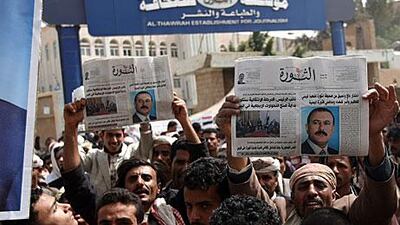SANAA // If any Yemenis thought that this month's transition from President Ali Abdullah Saleh to his vice president would ease the turmoil that has beset the country for nearly a year, they were set straight by a recent dispute over a picture - namely, a photo of Mr Saleh on the masthead of the government newspaper.
After Yemen's new information minister last week ordered Mr Saleh's photo removed from the masthead of the government's flagship newspaper, where it has been enshrined for much of his 33-year rule, his newsroom loyalists took control of the paper and returned his image to its traditional perch.
The newspaper brouhaha, analysts say, is just a symptom of a disease that promises to plague the country for some time. Mr Saleh's allies, they say, will not surrender or share their power and prerogatives without resistance.
"Some tribal and military as well as business or political influential figures have enriched and built their own influence during the reign of Saleh", said Abdulbaki Shamsan, a professor of political sociology at Sanaa University. "They are expected to fight from behind the scenes" to disrupt the transition.
Nobody is sure what will happen after February 21, when Mr Saleh, who is in the United States for medical treatment, is set to hand over power to his vice president. One thing is certain: even if he surrenders his presidency on schedule and, as rumoured, lives in exile in Oman, he will still have influence in Yemen.
He will remain head of the ruling General People's Congress and under the transition deal that guarantees him immunity from criminal prosecution, he will be able to travel and work without the shadow of a courtroom hanging over him.
Mr Saleh's lingering power was clearly at play when the new information minister, Ali Al Amrani, began making changes in the operations of government newspapers and TV stations.
Mr Al Amrani was an MP in Saleh's party but defected last year to protest the crackdown on demonstrators. He joined the protest movement and was nominated by the opposition to be the information minister when the unity government was named.
But pro-regime journalists took a dim view of the changes. On Friday, the journalists, backed by armed men, invaded Al Thawra, which means "revolution" and refers to a Yemeni revolt in 1962. They forcibly restored his photo at the top of that day's edition.
"Saleh loyalists are in bad need to stand together now and therefore any provoking act against them will be met with firm and unruly reactions," Mr Shamsan said.
After the confrontation at Al Thawra, other armed men besieged Al Jumhuriah, the second-largest national daily, based in the city of Taiz, and stopped its publication on Saturday.
"I have received threats that they would bomb the paper and my house if the paper goes to the printing press and this is why we stopped the printing and ran the copy on the website only," said Sameer Al Yousufi, editor of Al Jumhuriah.
The paper resumed publication on Sunday but with Saleh's image on the front page instead of the countdown to the election that the editors had put in that spot.
Putting Mr Saleh's photo back on front page each day came after a meeting Saturday between leaders of Saleh's party and officials of the new interim leader government.
Under Mr Saleh, state media were controlled by the government and were required to publish and broadcast only stories that promoted the government's policies and actions.
Such media played an important role in supporting the regime during the anti-Saleh uprising which started in January 2011. But, after the formation of the unity government in December, the two national newspapers began reporting stories about opposition groups and publishing opinion pieces written by government critics.
Saleh supporters accused the papers of inciting division within the country. They said that sort of content violates the policy of the unity government.
Abduhafiz Al Nihari, a spokesman for Saleh's party, said incidents like the confrontations at the newspapers are a "normal reaction against the policy of marginalisation, vendetta and exclusion."
However, Abdulbari Taher, an independent analyst and a freelance writer, said the influential hardliners in Saleh's party are trying to discredit or even delay the election in which the vice president, Abdurabu Mansur Hadi, will be elected to run the country in a two-year transition period.
Saleh loyalists are trying to disrupt the election, Mr Taher said, because it "abolishes their legitimacy and establishes a new legitimacy that has both public and international support".

